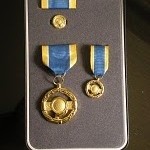I walked away from my conversation with John’s only remaining family, a sister and brother-in-law, wishing I had known him better when he was alive. But that always happens when I interview a family before attempting to conduct a memorial service or funeral.
 John died on a Wednesday. He was a member of The Special Gathering, a ministry within the mentally challenged community. An important part of our Melbourne program and a member of the choir, we were often cloistered in the van traveling with the rest of the singers.
John died on a Wednesday. He was a member of The Special Gathering, a ministry within the mentally challenged community. An important part of our Melbourne program and a member of the choir, we were often cloistered in the van traveling with the rest of the singers.
Therefore, I probably knew him as well as anyone did, other than his family. But I realized as I got into my car and sat for a few moments reflecting on John’s life that there was so much more to know about him. These were important things about his past that had shaped him into the man I admired.
There were vital details that I didn’t know or understand. John was 84 when he died. Which means that he was about 74 when I met him. He was a tall and thin man who always stood straight, proud and erect. He smiled often but you had to savor his words because he didn’t often share his thoughts with anyone.
John was born and raised on the farm. All his life, he knew hard, hard work. Therefore, he was stronger than most men half his age. He loved to work; but, like many people, he was hesitant to push himself into an unknown situation, concerned that he might make a mistake.
 For 65 years, John was a devoted train watcher. The trains carried coal from the mines of Pennsylvania, running directly through the middle of the farm. Most of his life, his partner in the fields was his father. Unwavering, the pair sweated through the heat of the day and pouring rain. But the men would leave their plow and hoe and straighten up as soon as the rambling or whistle could be heard. They would take off their hat, pull out a handkerchief and wipe the sweat from their face and neck. The duo watched every train as the cars ambled or raced through the middle of their crops.
For 65 years, John was a devoted train watcher. The trains carried coal from the mines of Pennsylvania, running directly through the middle of the farm. Most of his life, his partner in the fields was his father. Unwavering, the pair sweated through the heat of the day and pouring rain. But the men would leave their plow and hoe and straighten up as soon as the rambling or whistle could be heard. They would take off their hat, pull out a handkerchief and wipe the sweat from their face and neck. The duo watched every train as the cars ambled or raced through the middle of their crops.
“If Mother caught them, she would scold unmercifully,” his sister reported, but her temper couldn’t keep them from stopping when the next trains rambled past.
After John severely broke his leg at the age of 65, his sister and her husband brought him to Florida. He lived with them for the next 15 years. He continued to work, helping with the household chores. He went to Easter Seals at the Alzheimer’s section. Though he had not one bit of Alzheimer’s, he delighted in helping to push the wheelchairs of the other more frail members of the troop.
While we don’t ever admit it, there is something wonderful about death, that final passage of life. Because people stop to remember. We brace our hoe under their armpit and take off their hats. Slowly, we wipe our brows and listen and embrace the rambling noise of memories. And for a brief moment in time, we allow ourselves to rejoice in the past.
Jesus said at the last supper, “Do this to remember me.” Memory is a vital part of the Judeo-Christian heritage. The passover is a ritual of remembering. But somehow we refuse to do it. Our lives are wrapped tightly in the present and future. Even our older generations, don’t take the time to remember…or we don’t take the time to listen.
But death abruptly unwraps the cocoons of our present and our future and we come to a screeching halt as the noise of the past slaps us in the face. The only thing John’s family, friends and I have left are our memories of him. His quick smile. The way he said, “I know.” Consequently, for a few days, we’ll savor and nourish and treasure those memories. We will remember.
What are the treasured memories you have of your family and friends? What family member do you miss the most? What memories are you impressing on your family and members?

